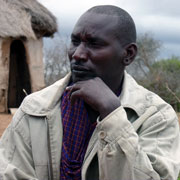Leboi Ngoira is also from Terrat in Simanjiro and tells as similar story to that of Lesira. Born in 1972, he recalls his childhood years in the 1980s as having a lot of rain. He remembers clearly that from October to June, rain would be guaranteed. As a result, there was plenty of water for the livestock and there was also plenty of water in for people to drink. In 1993, Leboi recalls the first time he had to move from Terrat to look for water because there was no rain during the usual months. The drought that affected Terrat in that year caused Leboi to question the cause of the change. Such unpredictable rainfall patterns continued after that, culminating in the drought of 1997 when many livestock died. That year Leboi lost 10 cattle out of his herd of 30. As the Maasai’s livelihoods are reliant on livestock, this drought forced many to start searching for alternative livelihood options. Leboi believes this began was the beginning of small crop farming, mainly harvesting maize. However, he fears that as maize is also dependent on rain, continued climactic instability could have disastrous impacts on the Maasai generally.
In 2009, Leboi witnessed the worst drought he can remember, as he doesn’t recollect any rain at all that year. Many Masaai from Kenya entered Tanzania in search of water, which caused some conflicts and even migration of Masaai to cities like Dar es Salaam and Arusha to look seek work. The drought of 2009 made Leboi think of ways in which the government can help the Masaai community. For example, the government could provide small loans to buy livestock when they die from draught, which could be paid back after breeding.
Leboi also has observed increased environmental degradation where he lives, and he believes this is mostly human-induced. He points out unsustainable deforestation, and with an increased population, and he feels that this problem will only worsen over time. Leboi believes that there needs to be firm laws and policies in place to protect forests. He realizes that although such laws may be present, there needs to be stronger enforcement the laws for them to truly protect the forests. There also should be mechanisms in place to reduce land conflicts, such as sound participatory land planning that could help reduce conflict.

